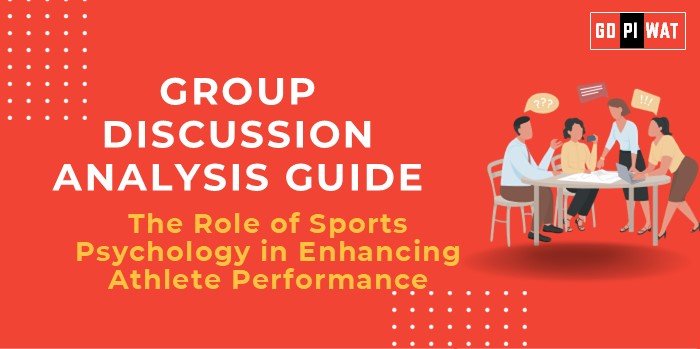📋 Group Discussion (GD) Analysis Guide
🧠 The Role of Sports Psychology in Enhancing Athlete Performance
🌐 Introduction to the Role of Sports Psychology
Opening Context: In the competitive world of sports, where physical prowess is often matched by mental resilience, sports psychology has emerged as a critical tool for optimizing athlete performance.
Topic Background: Originating as an interdisciplinary field combining psychology and sports science, sports psychology focuses on understanding and enhancing the mental processes that underpin athletic success. From improving focus to managing pressure, it plays a pivotal role in both individual and team sports.
📊 Quick Facts and Key Statistics
- 🏅 Nearly 80% of Olympic athletes have worked with sports psychologists to improve their performance (IOC, 2022).
- ⚠️ Stress can reduce athletic performance by up to 20% (Journal of Sports Science, 2023).
- 🎯 Athletes using visualization techniques improve their skills 30% faster than those relying solely on physical training.
- 🤝 Teams with integrated sports psychology programs report a 25% increase in cohesion and performance metrics.
👥 Stakeholders and Their Roles
- Athletes: Utilize mental conditioning for skill enhancement and stress management.
- Coaches: Collaborate with psychologists to create tailored training regimens.
- Sports Psychologists: Develop strategies to build confidence, focus, and resilience.
- Sports Organizations: Incorporate mental training in athlete development programs.
🏆 Achievements and Challenges
✨ Achievements
- Enhanced performance through psychological techniques (e.g., NBA’s mindfulness training).
- Faster injury recovery through mental resilience and focus.
- Improved team dynamics in the English Premier League through psychology-led programs.
⚠️ Challenges
- Stigma preventing athletes from seeking help.
- Limited access to sports psychologists in developing nations.
- Short-term focus on results instead of sustained mental conditioning.
🌍 Global Comparisons
- USA: Comprehensive psychological support for Olympic athletes.
- India: Emerging focus, with initiatives in cricket and shooting teams.
- Australia: Pioneering the integration of psychology into junior athlete training.
📚 Case Studies
- Michael Phelps: Credits his success to visualization and relaxation techniques.
- Indian Cricket Team: Improved performance under mental conditioning experts.
🗣️ Structured Arguments for Discussion
- Supporting Stance: “Incorporating sports psychology leads to measurable performance improvements.”
- Opposing Stance: “Mental training programs often overshadow technical skill development.”
- Balanced Perspective: “While sports psychology is transformative, its benefits must complement physical training.”
💡 Effective Discussion Approaches
- Opening Approaches:
- 📊 Highlighting key statistics about performance improvement through sports psychology.
- 📖 Sharing a compelling athlete story emphasizing mental strength.
- 🌍 Contrasting the progress of countries with and without robust psychological training programs.
- Counter-Argument Handling:
- 📈 Emphasize long-term benefits of mental conditioning with examples.
- 💰 Highlight cost-effective integration methods to counter resource concerns.
🔎 Strategic Analysis of Strengths and Weaknesses
- Strengths: Enhances performance, promotes mental well-being, builds resilience.
- Weaknesses: Accessibility challenges, stigma, dependency risks.
- Opportunities: Integration with AI-driven analytics for personalized training.
- Threats: Over-reliance on mental techniques might dilute physical training focus.
🎓 Connecting with B-School Applications
- Real-World Applications: Potential themes in team management and stress handling.
- Sample Interview Questions:
- “How can sports psychology influence corporate team performance?”
- “Discuss a scenario where mental resilience impacted results.”
- Insights for B-School Students: Lessons in focus, stress management, and leadership.


